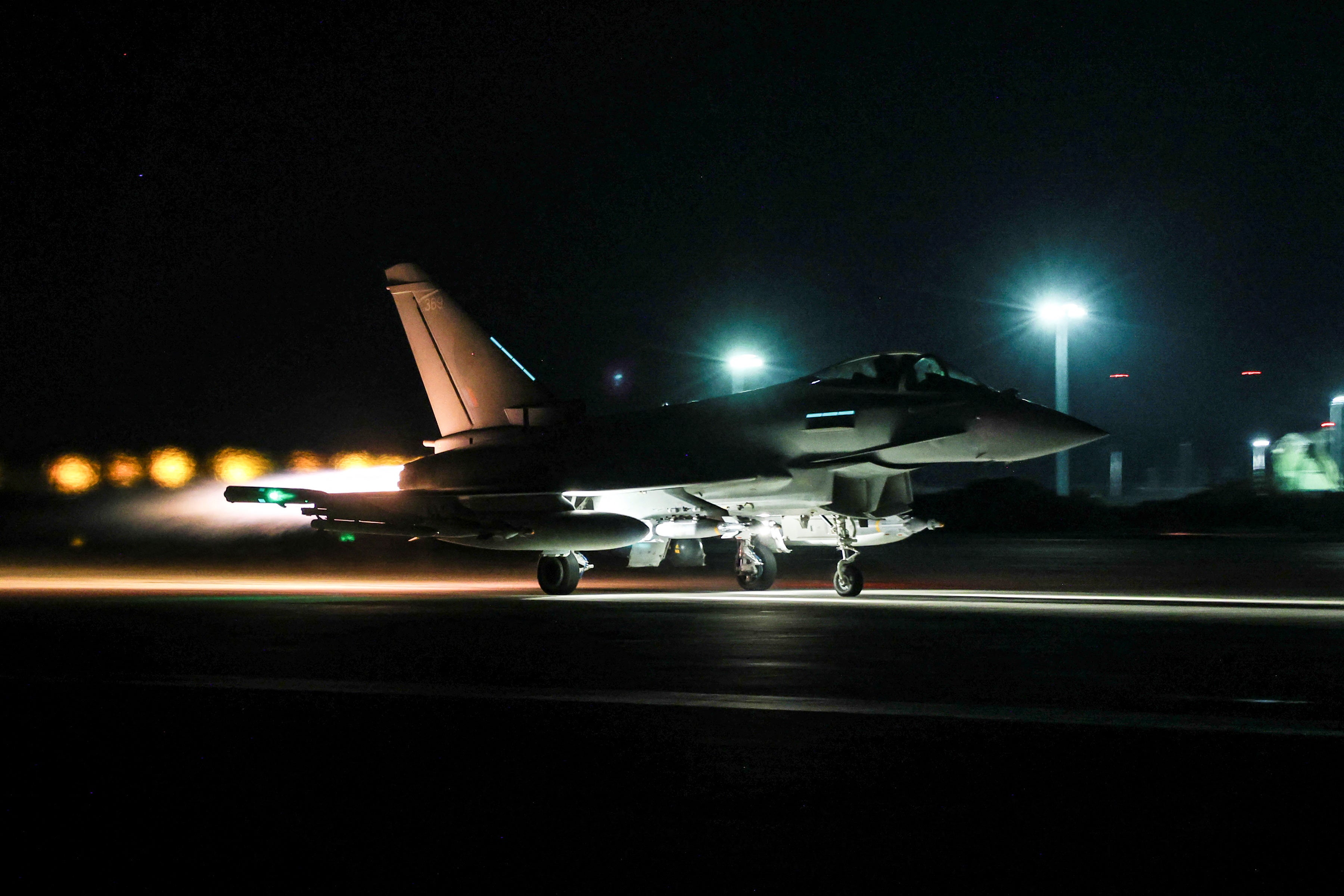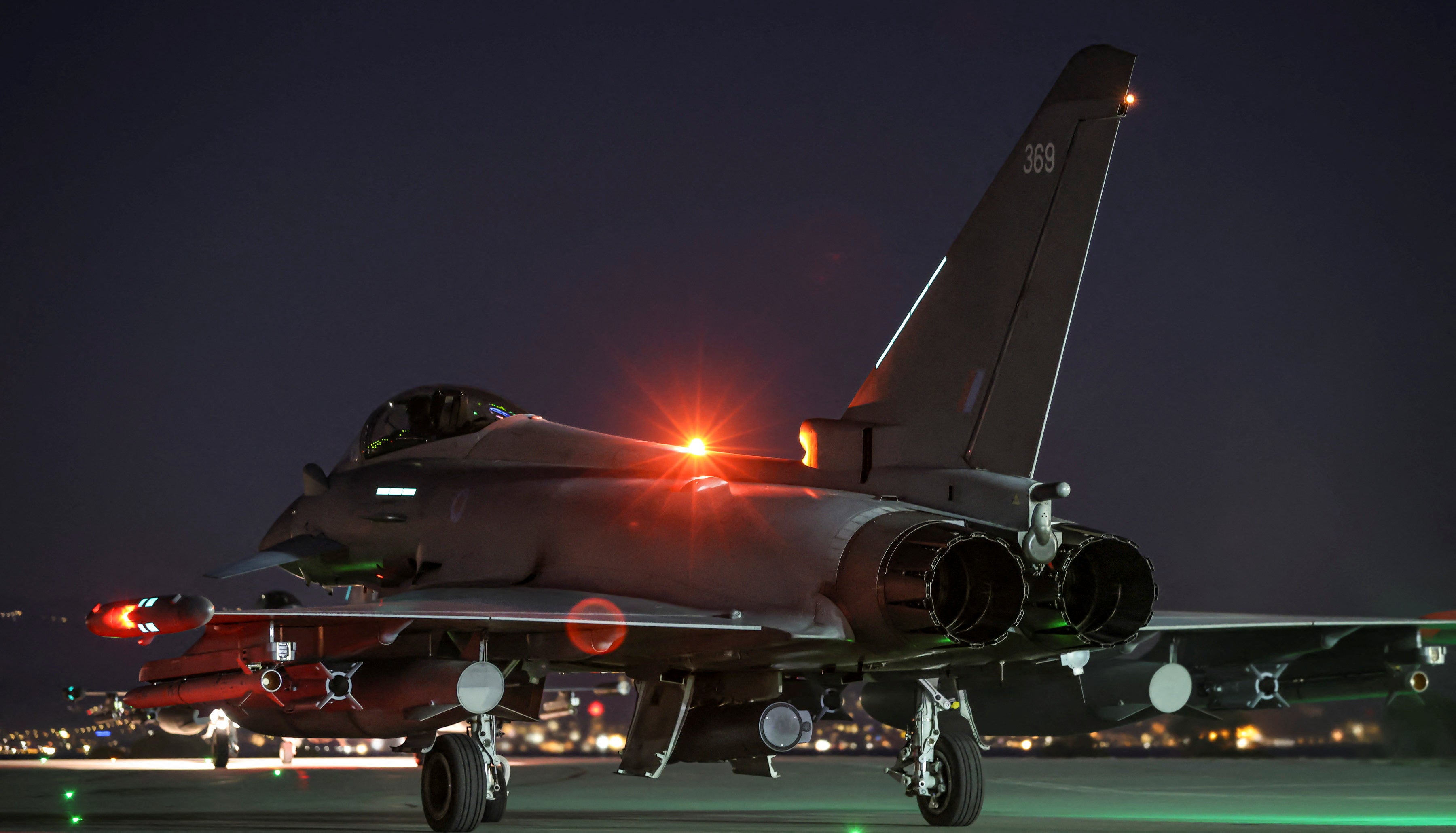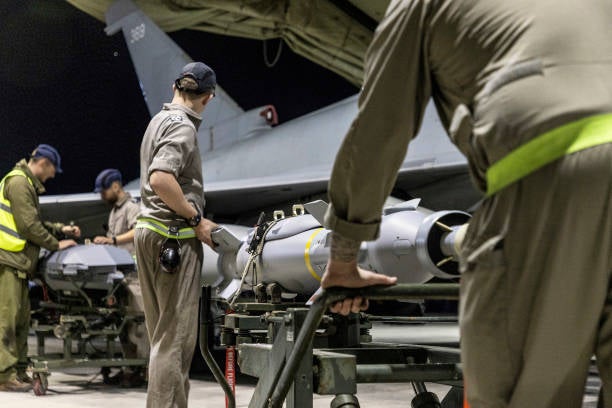Houthi strikes: US and UK hit more than a dozen Yemen targets in retaliation for Red Sea attacks
American and British fighter jets hit about 18 Houthi targets across multiple locations in Yemen
Your support helps us to tell the story
From reproductive rights to climate change to Big Tech, The Independent is on the ground when the story is developing. Whether it's investigating the financials of Elon Musk's pro-Trump PAC or producing our latest documentary, 'The A Word', which shines a light on the American women fighting for reproductive rights, we know how important it is to parse out the facts from the messaging.
At such a critical moment in US history, we need reporters on the ground. Your donation allows us to keep sending journalists to speak to both sides of the story.
The Independent is trusted by Americans across the entire political spectrum. And unlike many other quality news outlets, we choose not to lock Americans out of our reporting and analysis with paywalls. We believe quality journalism should be available to everyone, paid for by those who can afford it.
Your support makes all the difference.The US and Britain have struck more than a dozen Houthi targets in Yemen in response to a recent surge in attacks by the Iran-backed militia group on ships in the Red Sea.
American and British fighter jets hit about 18 sites across multiple locations, targeting missiles, launchers, rockets, drones and unmanned surface and underwater vehicles, according to US officials.
The UK’s ministry of defence said the Royal Airforce had launched the wave of strikes to degrade Houthi drones and missile launchers.
It comes after a UK-owned cargo ship was set on fire off the southern coast of Yemen after being struck in a missile attack on Thursday.
It is the fourth time that the US and British militaries have conducted a combined operation against the Houthis since 12 January.
The US has also been carrying out almost daily strikes to take out Houthi targets, including incoming missiles and drones aimed at ships, as well as weapons that were prepared to launch.
Thanks for following our live updates, we are pausing our coverage for the morning.
Strikes 'necessary and proportionate', says Pentagon
In a statement, the Pentagon said that Saturday’s “necessary and proportionate strikes specifically targeted 18 Houthi targets across eight locations in Yemen associated with Houthi underground weapons storage facilities, missile storage facilities, one-way attack unmanned aerial systems, air defence systems, radars, and a helicopter”.
“These precision strikes are intended to disrupt and degrade the capabilities that the Houthis use to threaten global trade, naval vessels, and the lives of innocent mariners in one of the world’s most critical waterways.”
The statement said that the Houthis’ “now more than 45 attacks on commercial and naval vessels since mid-November constitute a threat to the global economy, as well as regional security and stability, and demand an international response”.
How have Houthi strikes affected cargo movement
Earlier this week the Houthis claimed responsibility for an attack on a UK-owned cargo ship and a drone assault on an American destroyer, and they targeted Israel’s port and resort city of Eilat with ballistic missiles and drones.
The group’s strikes are disrupting the vital Suez Canal trade shortcut that accounts for about 12 per cent of global maritime traffic, and forcing firms to take a longer, more expensive route around Africa.

No ships have been sunk nor crew killed during the Houthi campaign. However, there are concerns about the fate of the UK-registered Rubymar cargo vessel, which was struck on 18 February and its crew evacuated.
Strikes meant ‘to disrupt and degrade capabilities of Houthi militia'
US defense secretary Lloyd Austin said the strikes were meant “to further disrupt and degrade the capabilities of the Iranian-backed Houthi militia.”
“We will continue to make clear to the Houthis that they will bear the consequences if they do not stop their illegal attacks, which harm Middle Eastern economies, cause environmental damage and disrupt the delivery of humanitarian aid to Yemen and other countries,” Mr Austin added.

How were the targets identified?
Intelligence analysis had successfully identified several very long-range drones, used by the Houthis for both reconnaissance and attack missions, at a former surface-to-air missile battery site several miles north east of Sanaa, the Ministry of Defence said of yesterday’s strikes.
“Our aircraft used Paveway IV precision guided bombs against the drones and their launchers, notwithstanding the Houthis’ use of the old missile battery revetments to try to protect the drones.”
It added: “In planning the strikes, as is normal practice with such RAF operations, the greatest possible care was taken to minimise any risk of civilian casualties.”
Houthi attacks on vessels threatened global economy, say Western allies
A joint statement from Australia, Bahrain, Denmark, Canada, the Netherlands, New Zealand, the UK and the US said the Houthis had staged more than 45 attacks on commercial and naval vessels since mid-November, which threatened the global economy, as well as regional security and stability.
“Our coalition of like-minded countries remains committed to protecting freedom of navigation and international commerce and holding the Houthis accountable for their illegal and unjustifiable attacks on commercial shipping and naval vessels,” the statement said.

“Our aim remains to de-escalate tensions and restore stability in the Red Sea, but we will once again reiterate our warning to Houthi leadership: we will not hesitate to continue to defend lives and the free flow of commerce in the face of continued threats.”
The statement said yesterday’s strikes “targeted 18 Houthi targets across eight locations in Yemen associated with Houthi underground weapons storage facilities, missile storage facilities, one-way attack unmanned aerial systems, air defence systems, radars and a helicopter”.
Yemen's Houthis target fuel tanker Torm Thor in Gulf of Aden
Yemen’s Houthis targeted MV Torm Thor, a US-flagged, owned, and operated oil tanker, in the Gulf of Aden, the Iran-aligned group’s military spokesperson Yahya Sarea said on Sunday, as the militants continue to attack shipping lanes in solidarity with Palestinians in Gaza.
The group targeted the tanker with “a number of appropriate naval missiles,” Mr Sarea added in a televised speech.
The US Central Command (Centcom) said the USS Mason, a guided missile destroyer, on Saturday shot down one anti-ship ballistic missile launched into the Gulf of Aden from Houthi-controlled areas in Yemen that was likely targeting the tanker.
Neither the USS Mason nor MV Torm Thor were damaged and there were no injuries, Centcom added in a statement.
The Houthis, who control the most populous parts of Yemen, have launched exploding drones and missiles at commercial vessels since 19 November as a protest against Israel’s military operations in Gaza.
The US and Britain have launched strikes on Houthi targets in Yemen and redesignated the militia as a terrorist group.
The turmoil from Israel’s war with the Palestinian Islamist group Hamas has spilled over to some extent into other parts of the Middle East. Apart from the Houthi attacks on vital shipping lanes, Lebanon’s Iran-backed Hezbollah group has traded fire with Israel along the Israel-Lebanon border and pro-Iran Iraqi militia have attacked bases that host US forces.
Strikes get support from wider Western coalition
The strikes have support from a wider coalition of countries including Australia, Bahrain, Canada, Denmark, the Netherlands and New Zealand.
In a statement, the US, UK and other allies said the “necessary and proportionate strikes specifically targeted 18 Houthi targets across eight locations in Yemen” that also included underground storage facilities, radar and a helicopter.
Both prime minister Rishi Sunak and president Joe Biden have repeatedly said that attacks on the key global shipping route will not be tolerated.
‘Our duty to protect lives at sea’
Issuing a statement on the strikes against the Houthis, defence secretary Grant Shapps said: “It is our duty to protect lives at sea and preserve freedom of navigation.
“That is why the Royal Air Force engages in a fourth round of precision strikes against Houthi military targets in Yemen.”

Mr Shapps said it came after “severe Houthi attacks against commercial ships in the Red Sea and Gulf of Aden, including against the British-owned MV Islander and the MV Rubymar, which forced the crew to abandon ship”.
Houthis attack US owned oil tanker
Yemen’s Iran-aligned Houthis targeted MV Torm Thor, a U.S.-flagged, owned, and operated oil tanker, in the Gulf of Aden, the group’s military spokesman Yahya Sarea said in a televised speech.
The Houthis say they have been attacking shipping lanes in solidarity with the Palestinians in the Gaza War. It comes after the US and UK launched airstrikes on 18 Houthi targets across Yemen.

Join our commenting forum
Join thought-provoking conversations, follow other Independent readers and see their replies
Comments